Understanding Conflict and Negotiation
Conflict is an inevitable part of any relationship, whether personal or professional. It arises when two or more parties have different interests, needs, or goals that cannot be reconciled. Negotiation, on the other hand, is a process of communication aimed at reaching a mutually beneficial agreement. Resolving conflict through negotiation is a crucial skill that can help individuals and organizations build stronger relationships, improve communication, and achieve their goals.
In today’s fast-paced and interconnected world, conflicts can arise from various sources, including cultural differences, power imbalances, and conflicting values. Effective negotiation skills can help resolve these conflicts by identifying common interests, creating value, and finding creative solutions. When done correctly, negotiation can lead to a win-win outcome, where all parties feel satisfied with the result.
The Principles of Effective Negotiation
Effective negotiation is built on several key principles, including:
Active Listening
Active listening is the foundation of effective negotiation. It involves fully concentrating on what the other party is saying, understanding their needs and concerns, and responding in a way that shows you are engaged. Active listening helps build trust, creates a positive atmosphere, and encourages open communication.
Separating Interests from Positions
Interests refer to the underlying needs, desires, and concerns that drive a party’s position. Separating interests from positions helps negotiators focus on the underlying issues rather than getting stuck on a particular solution. This approach encourages creative problem-solving and can lead to innovative solutions.
Focusing on Mutual Gains
Negotiation is not a zero-sum game, where one party’s gain is the other party’s loss. Focusing on mutual gains encourages negotiators to look for solutions that benefit both parties. This approach builds trust, fosters cooperation, and leads to more sustainable agreements.
Using Objective Criteria
Objective criteria, such as industry standards, expert opinions, or data, can help negotiators reach a fair and reasonable agreement. Using objective criteria can reduce the risk of impasse and increase the likelihood of a mutually beneficial outcome.
The Negotiation Process
The negotiation process involves several stages, including:
Preparation
Preparation is key to effective negotiation. It involves researching the other party, identifying their interests and needs, and developing a clear understanding of your own goals and limitations. Preparation helps negotiators stay focused, build confidence, and make informed decisions.
Opening Offers
The opening offer sets the tone for the negotiation. It should be realistic, reasonable, and based on objective criteria. A well-crafted opening offer can anchor the negotiation and create a positive atmosphere.
Bidding and Concessions
Bidding and concessions are an integral part of the negotiation process. Negotiators should be willing to make concessions, but only if they receive something of value in return. Bidding and concessions should be based on objective criteria and should aim to create a mutually beneficial agreement.
Closing the Deal
Closing the deal involves finalizing the agreement and ensuring that all parties are satisfied with the outcome. It involves summarizing the terms, addressing any concerns, and ensuring that the agreement is clear and concise.
Common Negotiation Mistakes to Avoid
Negotiation is a complex process that requires skill, strategy, and practice. Common negotiation mistakes to avoid include:
Making Concessions Too Quickly
Making concessions too quickly can undermine your bargaining power and create a sense of desperation. Negotiators should make concessions gradually, based on objective criteria, and only if they receive something of value in return.
Taking a Hardline Approach
A hardline approach can lead to impasse and damage relationships. Negotiators should be flexible, open-minded, and willing to compromise.
Failing to Listen
Failing to listen can lead to misunderstandings, miscommunication, and conflict. Negotiators should actively listen to the other party, ask questions, and clarify concerns.
Conclusion
Resolving conflict through negotiation is a crucial skill that can help individuals and organizations build stronger relationships, improve communication, and achieve their goals. By understanding the principles of effective negotiation, following the negotiation process, and avoiding common mistakes, negotiators can create a mutually beneficial agreement that satisfies all parties.
FAQ
What is the goal of negotiation?
The goal of negotiation is to reach a mutually beneficial agreement that satisfies all parties.
What is active listening, and why is it important in negotiation?
Active listening involves fully concentrating on what the other party is saying, understanding their needs and concerns, and responding in a way that shows you are engaged. Active listening is important in negotiation because it builds trust, creates a positive atmosphere, and encourages open communication.
What is the difference between interests and positions?
Interests refer to the underlying needs, desires, and concerns that drive a party’s position. Positions, on the other hand, refer to the specific solutions or outcomes that a party is seeking. Separating interests from positions helps negotiators focus on the underlying issues rather than getting stuck on a particular solution.










